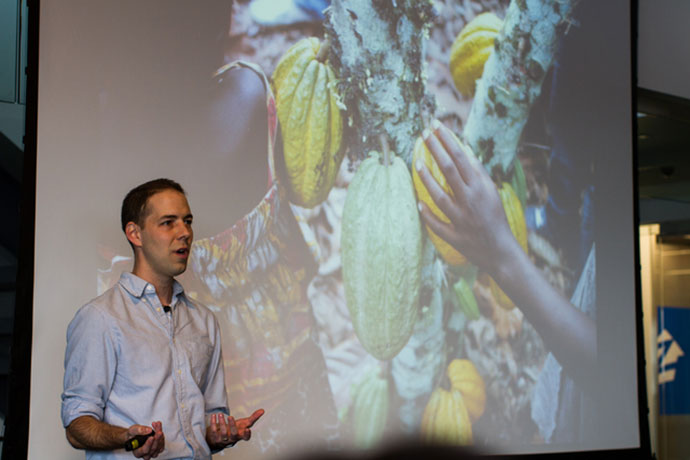Blog
Posted on April 15, 2015
By Kaitlin Marshall
 The first Earth Day took place on April 22, 1970 and is widely credited with launching the modern environmental movement. After witnessing the devastation of the 1969 oil spill in Santa Barbara, California, Gaylord Nelson, a U.S. Senator from Wisconsin, was inspired to mobilize citizens to force environmental protection onto the national political agenda. Nelson persuaded Pete McCloskey, a fellow congressman, to serve as his co-chair and recruited Denis Hayes as national coordinator. Hayes built a national staff of 85 to promote Earth Day events across the country. On the first Earth Day, 20 million Americans took to the streets to demand protection for the environment. In 1990, Hayes organized another campaign and focused his efforts globally. His campaign mobilized 200 million people in 141 countries. Earth Day was transformed from an annual national event to an annual global celebration.
The first Earth Day took place on April 22, 1970 and is widely credited with launching the modern environmental movement. After witnessing the devastation of the 1969 oil spill in Santa Barbara, California, Gaylord Nelson, a U.S. Senator from Wisconsin, was inspired to mobilize citizens to force environmental protection onto the national political agenda. Nelson persuaded Pete McCloskey, a fellow congressman, to serve as his co-chair and recruited Denis Hayes as national coordinator. Hayes built a national staff of 85 to promote Earth Day events across the country. On the first Earth Day, 20 million Americans took to the streets to demand protection for the environment. In 1990, Hayes organized another campaign and focused his efforts globally. His campaign mobilized 200 million people in 141 countries. Earth Day was transformed from an annual national event to an annual global celebration.
Since the first Earth Day, several groundbreaking laws have passed including the Clean Air Act, Clean Water Act and Endangered Species Act. The Earth Day Network (EDN) now works with over 22,000 partners in 192 countries to broaden and mobilize the environmental movement. And, more than 1 billion people now participate in Earth Day activities each year, making Earth Day the largest civic observance in the world.
Continue Reading
Posted on April 6, 2015
The following story was originally posted on the Zillow News blog and written by Melissa Allison

Photo: Adam Cohn
The ethical sourcing of chocolate is important for many reasons: the health of our bodies, the health of the planet, and the financial and physical well-being of cocoa farmers, among others.
So it was with great interest that Zillowites packed the house to hear guest speaker Nathan Palmer-Royston, the cocoa sourcing manager for Theo Chocolate, the country’s first organic and fair trade-certified chocolate factory — and a source of Seattle pride, located just four miles north of Zillow Tower.
Palmer-Royston spends much of the year in tropical zones, working with farmers and extension officers in countries where cocoa is grown.
Continue Reading
Posted on March 30, 2015
By Jeff Halvorson
On Friday, March 20, 2015, Global Washington partnered with Seattle International Foundation to host a business roundtable with Transparency International’s Regional Director for the Americas, Alejandro Salas. In Russell Investments’ downtown Seattle headquarters with a backdrop of Elliot Bay, leaders from six global companies discussed corruption, one of the biggest issues facing organizations across both the private and public sectors.
 Following three Seattle-based groups making Ethisphere’s 2015 list of the World’s Most Ethical Companies, the discussion with Salas was timely. Seattle is home to a number of corporations known for their progressive business practices. This breakfast brought together leaders from Russell Investments, Holland America Line, Expedia, Costco, Carrix and Starbucks.
Following three Seattle-based groups making Ethisphere’s 2015 list of the World’s Most Ethical Companies, the discussion with Salas was timely. Seattle is home to a number of corporations known for their progressive business practices. This breakfast brought together leaders from Russell Investments, Holland America Line, Expedia, Costco, Carrix and Starbucks.
Continue Reading
 The first Earth Day took place on April 22, 1970 and is widely credited with launching the modern environmental movement. After witnessing the devastation of the 1969 oil spill in Santa Barbara, California, Gaylord Nelson, a U.S. Senator from Wisconsin, was inspired to mobilize citizens to force environmental protection onto the national political agenda. Nelson persuaded Pete McCloskey, a fellow congressman, to serve as his co-chair and recruited Denis Hayes as national coordinator. Hayes built a national staff of 85 to promote Earth Day events across the country. On the first Earth Day, 20 million Americans took to the streets to demand protection for the environment. In 1990, Hayes organized another campaign and focused his efforts globally. His campaign mobilized 200 million people in 141 countries. Earth Day was transformed from an annual national event to an annual global celebration.
The first Earth Day took place on April 22, 1970 and is widely credited with launching the modern environmental movement. After witnessing the devastation of the 1969 oil spill in Santa Barbara, California, Gaylord Nelson, a U.S. Senator from Wisconsin, was inspired to mobilize citizens to force environmental protection onto the national political agenda. Nelson persuaded Pete McCloskey, a fellow congressman, to serve as his co-chair and recruited Denis Hayes as national coordinator. Hayes built a national staff of 85 to promote Earth Day events across the country. On the first Earth Day, 20 million Americans took to the streets to demand protection for the environment. In 1990, Hayes organized another campaign and focused his efforts globally. His campaign mobilized 200 million people in 141 countries. Earth Day was transformed from an annual national event to an annual global celebration.
 Following three Seattle-based groups making Ethisphere’s 2015 list of the
Following three Seattle-based groups making Ethisphere’s 2015 list of the